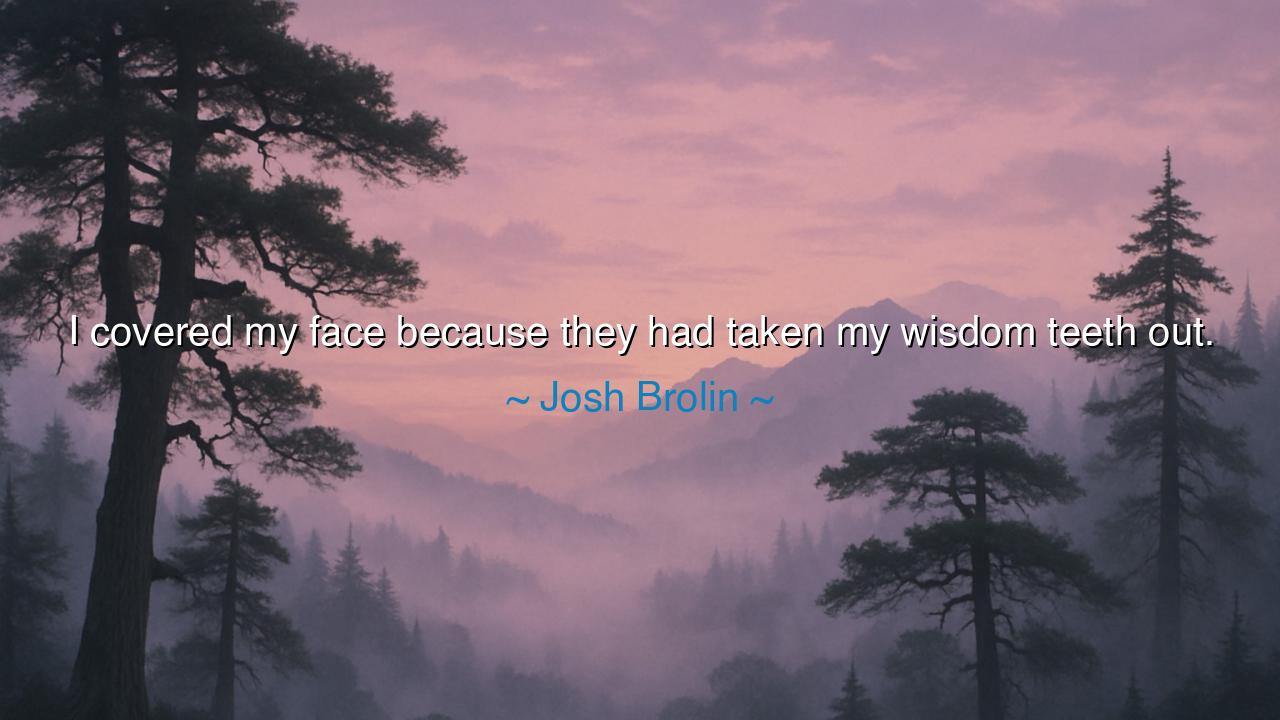
I covered my face because they had taken my wisdom teeth out.






Hearken, children of the ages, to the whimsical yet insightful words of Josh Brolin, who confessed: “I covered my face because they had taken my wisdom teeth out.” Though spoken with humor, these words conceal a subtle reflection on the fragility of the human condition and the vulnerability of the body, even as it carries the promise of wisdom. The loss of these teeth—often called “wisdom teeth”—becomes a gentle metaphor for the human experience: we protect ourselves when weakened, even as we bear the marks of learning and growth.
Brolin’s reflection teaches that wisdom, like the body, is not invincible. The extraction of wisdom teeth is a minor trial, yet it reminds us that even those who seem strong must sometimes retreat, hide, or recover. Just as we shield ourselves in moments of physical vulnerability, so too must the soul occasionally seek repose after the extraction of its own burdens or trials. There is humor, but also humility, in recognizing the limits of our own endurance.
Consider the tale of Homer, who, though blind, composed epics that would endure for millennia. Homer’s blindness—a limitation in one sense—did not diminish the wisdom and insight of his words; yet it required adaptation, protection, and care. Like Brolin shielding his face, Homer’s challenge reminds us that vulnerability and brilliance often coexist, and that even the wisest among us must acknowledge their human frailties.
The ancients themselves saw humor as a companion to wisdom and experience. Socrates, who often exposed the follies of men through irony, knew that life’s trials—however small or amusing—teach humility and patience. Brolin’s quip about covering his face echoes this timeless insight: laughter and self-awareness are allies in the preservation of the spirit, even when the body is weakened.
Thus, his words are both comic and instructive: to protect oneself in moments of weakness is natural, and to acknowledge vulnerability is itself a sign of wisdom. Humor softens the weight of trial, allowing the mind to endure what the body must bear, and reminding us that all human experience—painful or absurd—contributes to the shaping of character.
Carry this teaching, children of generations yet to rise: embrace your vulnerabilities, shield yourself when necessary, and let humor and self-awareness guide you through the minor trials of life. Even in small tribulations, like the loss of wisdom teeth, there lies the eternal lesson that wisdom, humor, and humility are inseparable companions on the journey of existence.






NNnguyen thi nhu ngoc
This made me smile because it’s such a perfectly absurd statement. It takes a literal situation and turns it into wordplay about the loss of wisdom. Yet, I can’t help but see a touch of honesty in it—how we often hide when we feel our confidence slipping, even for something trivial. Maybe humor is Brolin’s way of reclaiming dignity from embarrassment. It’s silly, self-aware, and just the right amount of human.
THThao Han
It’s a short and witty comment, but it also feels oddly profound. Losing ‘wisdom teeth’ and covering one’s face could symbolize how we fear looking foolish or exposed. I wonder if Brolin’s humor hints at a broader truth: that people often mask their discomfort with jokes. It’s endearing, really—the mix of vulnerability and irony. Can humor itself be a kind of wisdom, helping us laugh at the things that momentarily undo us?
TTrung
This quote cracked me up—it’s classic dry humor. But beneath the joke, I sense something relatable about the way we hide ourselves when we feel vulnerable or altered. Maybe the act of covering his face wasn’t just physical embarrassment but symbolic—an instinct to conceal weakness. It’s funny how even in small moments, like recovering from dental work, people still care about appearances. Why are we so quick to disguise imperfection?
TTtai tran
I love how this statement turns a mundane event into something almost philosophical. Losing one’s wisdom teeth becomes a metaphor for feeling momentarily diminished. It makes me think about how people often use humor to cope with discomfort or insecurity. Is Brolin’s remark just a joke, or is there a hint of self-consciousness in it? Perhaps it’s about the small, strange ways we try to protect our dignity, even after dental surgery.
Ddoraemon
This line made me laugh—it’s so simple yet unexpectedly clever. There’s a playfulness in connecting physical pain to the symbolic loss of wisdom. I wonder if Brolin meant it as pure humor or as a subtle commentary on how we mask vulnerability with wit. Maybe covering the face isn’t just about embarrassment but about hiding the momentary loss of control. Either way, it’s a wonderfully human reaction to something so ordinary.